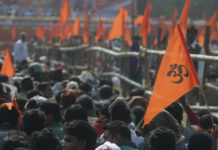British Muslims are being urged to wear a new “Poppy Hijab’ – as a challenge to extremist groups who ‘spout hatred’ about the Armed Forces.
The scarf is backed by government-friendly Muslim groups including the Islamic Society of Britain and profits from its sale will be donated to the Poppy Appeal.
The scarf, which costs £22, will be launched tomorrow to mark 100 years since the first Muslim soldier was awarded the Victoria Cross for his bravery during the WW1.
Sughra Ahmed, President of the Islamic Society of Britain, said she wanted to take attention away from the “angry minority” of extremists who spout hatred.
Ms Ahmed said: “Thousands of British Muslims already wear a poppy in November. This is just another way for them to show they remember those who gave their lives for their country.
“It’s also a way for ordinary Muslim citizens to take some attention away from extremists who seem to grab the headlines.
“This symbol of quiet remembrance is the face of everyday British Islam – not the angry minority who spout hatred and offend everyone.
Subscribe to our newsletter and stay updated on the latest news and updates from around the Muslim world!
“We’re launching this today as it’s exactly 100 years since the first Muslim soldier was awarded the Victoria Cross for bravery – Khudadad Khan from Pakistan, who was fighting for Britain on the Western Front in the First World War.’
Khan was a member of the 129th Baluchis regiment fighting near in Belgium.
On 31st October, 1914, at Hollebeke, Sepoy Khudadad carried on firing the gun on his own, after the five other men of his gun detachment were killed.
Despite having been wounded, he fought on long enough to hold off an enemy advance until Indian and British reinforcements arrived. He was awarded the highest military award for gallantry by King George V in December that year.
More than 400,000 Muslim soldiers fought for Britain in World War 1.
Think tank British Future is promoting the scarf as part of efforts to remind the public about the role of Commonwealth soldiers in British military history.
The scarf was designed by a Muslim fashion designer, Tabinda-Kauser Ishaq, a 24-year-old student at the University of the Arts in London.
She said: “I hope the poppy headscarf gives Muslim women a new way to mark Remembrance Day and to help raise money for the Poppy Appeal. It’s a simple way to say you’re proudly British and proudly Muslim.”
However, many British Muslims will doubtless be less-than-taken with the initiative.
Some have already taken to social media to denounce the campaign as another attempt to make British Muslims prove their loyalty to the country.
Others have said the poppy itself is a symbol of the British Army which has invaded and occupied two Muslims countries in the last decade, leading to countless deaths and major destruction.
























